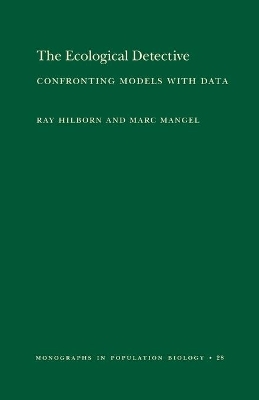
The Ecological Detective
Princeton University Press (Verlag)
978-0-691-03497-3 (ISBN)
- Lieferbar (Termin unbekannt)
- Versandkostenfrei innerhalb Deutschlands
- Auch auf Rechnung
- Verfügbarkeit in der Filiale vor Ort prüfen
- Artikel merken
The modern ecologist usually works in both the field and laboratory, uses statistics and computers, and often works with ecological concepts that are model-based, if not model-driven. How do we make the field and laboratory coherent? How do we link models and data? How do we use statistics to help experimentation? How do we integrate modeling and statistics? How do we confront multiple hypotheses with data and assign degrees of belief to different hypotheses? How do we deal with time series (in which data are linked from one measurement to the next) or put multiple sources of data into one inferential framework? These are the kinds of questions asked and answered by The Ecological Detective. Ray Hilborn and Marc Mangel investigate ecological data much as a detective would investigate a crime scene by trying different hypotheses until a coherent picture emerges. The book is not a set of pat statistical procedures but rather an approach. The Ecological Detective makes liberal use of computer programming for the generation of hypotheses, exploration of data, and the comparison of different models. The authors' attitude is one of exploration, both statistical and graphical.
The background required is minimal, so that students with an undergraduate course in statistics and ecology can profitably add this work to their tool-kit for solving ecological problems.
Ray Hilborn is Professor in the School of Fisheries, University of Washington and the coauthor, with Carl Walters, of Quantitative Fisheries Stock Assessment. Marc Mangel is Professor of Environmental Studies and a Fellow at College Eight at the University of California, Santa Cruz, and a Visiting Professor at the University of Glasgow. He is the author of Decision and Control in Uncertain Resource Systems and coauthor, with Colin Clark, of Dynamic Modeling in Behavioral Ecology.
Preface: Beyond the Null Hypothesis1An Ecological Scenario and the Tools of the Ecological Detective32Alternative Views of the Scientific Method and of Modeling123Probability and Probability Models: Know Your Data394Incidental Catch in Fisheries: Seabirds in the New Zealand Squid Trawl Fishery945The Confrontation: Sum of Squares1066The Evolutionary Ecology of Insect Oviposition Behavior1187The Confrontation: Likelihood and Maximum Likelihood1318Conservation Biology of Wildebeest in the Serengeti1809The Confrontation: Bayesian Goodness of Fit20310Management of Hake Fisheries in Namibia Motivation23511The Confrontation: Understanding How the Best Fit Is Found263Appendix"The Method of Multiple Working Hypotheses"281References295Index309
| Erscheint lt. Verlag | 6.3.1997 |
|---|---|
| Reihe/Serie | Monographs in Population Biology |
| Zusatzinfo | 67 line illus. 27 tables |
| Verlagsort | New Jersey |
| Sprache | englisch |
| Maße | 140 x 216 mm |
| Gewicht | 369 g |
| Themenwelt | Informatik ► Grafik / Design ► Digitale Bildverarbeitung |
| Mathematik / Informatik ► Mathematik ► Angewandte Mathematik | |
| Naturwissenschaften ► Biologie ► Botanik | |
| Naturwissenschaften ► Biologie ► Ökologie / Naturschutz | |
| Naturwissenschaften ► Biologie ► Zoologie | |
| ISBN-10 | 0-691-03497-4 / 0691034974 |
| ISBN-13 | 978-0-691-03497-3 / 9780691034973 |
| Zustand | Neuware |
| Informationen gemäß Produktsicherheitsverordnung (GPSR) | |
| Haben Sie eine Frage zum Produkt? |
aus dem Bereich


